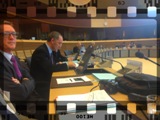With Article 17 of the Lisbon Treaty elevating dialogue between EU Institutions and churches, religious associations or communities, as well as philosophical and non-confessional organisations from simply ‘good practice’ to a legal obligation, enshrined in primary law, the value of the contribution made by such organisations to the European policy making process was recognised. The rich contributions made by expert contributors—confessional and non-confessional—at today’s seminar, entitled “Environmental protection and climate change as a challenge for policies – the role of ethics, lifestyles, solidarity and global justice” served to reiterate how valuable dialogue between the EU Institutions and churches can be.
In light of the IPCC’s 5th Assessment report, and in advance of the Warsaw Climate Change Conference, this seminar, organised jointly by the Church and Society Commission of the Conference of European Churches (CEC) and the Commission of the Episcopates of the European Community (COMECE), in collaboration with the Bureau of European Policy Advisors (BEPA), involved representatives from the Church, from the European Commission, from academia and from Non-Governmental Organisations, with a contribution made by video from Bangladesh by the Auxiliary Bishop of the Archdiocese of Dhaka, Mgr. Theotonius Gomes. The Commission representatives included Dr. Artur Runge-Metzger (Chief Climate Negotiator and Director for the International Climate Strategy at the EC’s Climate Department), Martin Scheele (Head of Unit, Environment, Directorate General for Agriculture and Rural Development) and Paul Renier (Deputy Head of Unit, Directorate General Development and Cooperation).
Considering the scientific evidence presented in the IPCC’s latest report, Prof. Goose from the Catholic University of Leuven highlighted the irrefutability of the anthropic factor among the causes of climate change. This indisputability was the foundation for the day’s discussion, with the disparity between simply acknowledging the evidence and acting upon this evidence being repeatedly emphasised.
Faith-based development organisations in attendance called for the EU to act based on its moral responsibility to do so: as Janna Schönfeld of APRODEV affirmed: “The EU is the second biggest historical emitter of CO2 after the US. At the same time, it is one of the richest regions of the world. The EU clearly has a moral responsibility to act.” This sentiment was echoed by Bernd Nilles of CIDSE (an international alliance of 16 Catholic development agencies from Europe and North America), who stated that “Continued exploitation of fossil fuel, growth based economies and a lack of commitment to finance mitigation and adaptation put vulnerable communities at risk.” Mgr. Gomes reaffirmed that “it is the poor who suffer because of climate injustice and climate change. We must take away from that suffering, rather than add to it.” Whilst the resources exist to feed, clothe and house everyone these benefits are not distributed equally —a fact which is exacerbated by geo-political borders.
Martin Scheele from the Commission emphasised the importance of increasing resource efficiency and addressing not only the chain of production, but also consumer behaviour (consumer awareness and the issue of consumer ‘choice’). Acknowledging one’s own responsibility, embracing the paradigm shift towards the ‘notion of enough’ and undertaking a lifestyle change is at the crux of addressing the anthropic factor. The role of the Church in achieving this was reiterated. If the Church is to realise its potential as a driving force in changing patterns of consumption, it must first get its own house in order, even if examples of best practice demonstrate that the Church is already proactive in this respect.
Finally, the call for bold, ambitious and binding targets, up to 2050 and beyond by Fr. Jose Ignacio Garcia SJ (JESC) was acknowledged by Dr. Runge-Metzger who said that whatever the financial cost of increasing targets on Climate Action, it was a small price to pay for future citizens —those born and those not-yet-born.
Concluding the seminar, the representatives of Churches expressed their readiness to make a substantial contribution towards mitigating the effects of climate change, from the COP (Conference of the Parties) in November 2013 in Warsaw to Peru (2014), Paris (2015) and beyond.
Whilst considering technical solutions, it is of critical importance that the spiritual aspect of stewardship is not neglected. Both Fr. Garcia and Rev. Henrik Grape of the Church of Sweden emphasised the spiritual dimension of being good stewards of creation. Fr. Garcia spoke of legitimate fear for the future but reminded participants that fear can lead to paralysis. He reflected that “fear can be cast out by love, by sincere love” and as Rev. Grape stated, “love for our planet, the creation that we are living in and we are dependent upon, forces us to act.”


